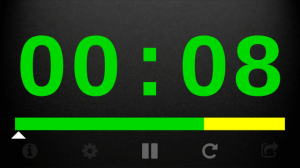[fusion_text]The 2009 iPhone commercial
App #1: A Timer
The only immovable rule of speaking that I preach is that a speaker must ALWAYS (yes, no exceptions, always) finish on time. But experience has shown me that speakers (including myself) are horrible at estimating how long they have been on stage (I frequently get students to guess how long they’ve been speaking and I might as well ask a random number generator – they have no idea). Therefore, there has to be an external input to alert the speaker to the time remaining. There are two sources I use for this: a timer or a human (with a timer/clock). I really don’t care what timer you use – there are hundreds of apps to choose from. I like one that will count up or down and show overtime (although I NEVER want to use it!). The bigger the numbers, the better – after all, you need to SEE the timer for it to be of benefit (and this is why the stock timer, at least for the iPhone, is not adequate).
App #2: Voice Recorder
The second app I use almost every time I speak is the voice recorder. For this, the stock app is more than sufficient, although there are additional apps that add timers, notes, outlines, video, and indexing. For me, I just need to hear what I said. I use this app, of course, for the recording, but it is only valuable to a speaker if he or she listens to the recording. Voice inflection, rate, pauses, volume, and flow are all critical skills that can only be evaluated accurately through a recording of speech. I would encourage any speaker to make use of recordings on a regular basis.
Using a phone as a recorder has two additional benefits. First, it’s almost completely stealthy. No one needs to even know you are recording. Hit the button as you walk on stage, and the phone will dutifully execute its task while you speak. Also, the microphones on the modern phone are amazing. It’s actually easier for me to get broadcast quality audio on my phone than it is with a full audio setup. Note I said easier – a phone mic is no replacement for a studio-quality mic mounted on a boom in a soundproof room. But it’s close enough for most any revenue work I do, and far beyond what I need to just review myself.
I am sure there are many other apps (and I’m talking later today with a developer about my ideas for a group speech review tool) that can be used. But these two are the most critical in my phone toolset.
Drop us a line and tell us what apps you use!
This article was published in the May 2015 edition of our monthly speaking tips newsletter,Communication Matters. Have speaking tips like these delivered straight to your inbox every month. Sign up today! [/fusion_text]


